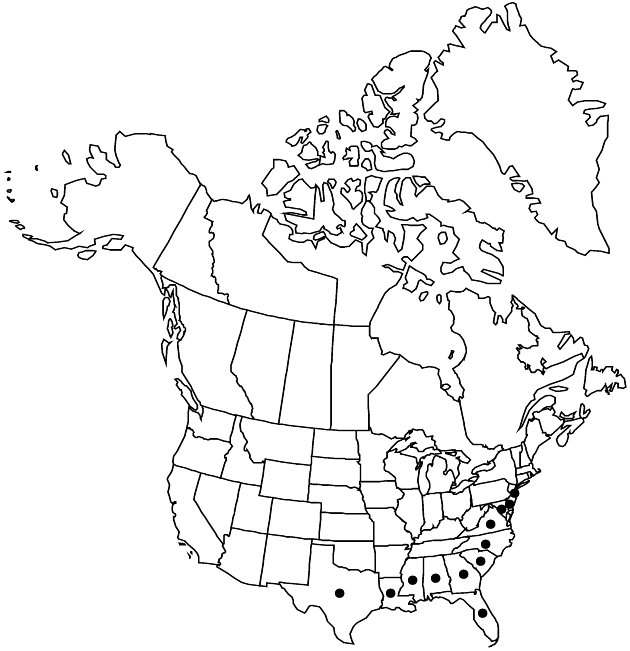Difference between revisions of "Solidago stricta"
Hort. Kew. 3: 216. 1789.
FNA>Volume Importer |
imported>Volume Importer |
||
| Line 20: | Line 20: | ||
-->{{Treatment/Body | -->{{Treatment/Body | ||
| − | |distribution= | + | |distribution=Ala.;Del.;Fla.;Ga.;La.;Md.;Miss.;N.C.;N.J.;S.C.;Tex.;Va.;Mexico;Central America. |
|discussion=<p>Subspecies 2 (2 in the flora).</p><!-- | |discussion=<p>Subspecies 2 (2 in the flora).</p><!-- | ||
--><p><i>Solidago</i> chrysopsis is interpreted here as just a diminutive form of <i>S. stricta</i> growing in the Florida Keys. <i>Solidago stricta</i> may hybridize with <i>S. sempervirens</i> in locations near salt marshes. <i>Solidago</i> flavovirens, from brackish marshes near Apalachicola, may be this species, or perhaps a hybrid with <i>S. sempervirens</i>.</p> | --><p><i>Solidago</i> chrysopsis is interpreted here as just a diminutive form of <i>S. stricta</i> growing in the Florida Keys. <i>Solidago stricta</i> may hybridize with <i>S. sempervirens</i> in locations near salt marshes. <i>Solidago</i> flavovirens, from brackish marshes near Apalachicola, may be this species, or perhaps a hybrid with <i>S. sempervirens</i>.</p> | ||
| Line 51: | Line 51: | ||
|basionyms= | |basionyms= | ||
|family=Asteraceae | |family=Asteraceae | ||
| − | |distribution= | + | |distribution=Ala.;Del.;Fla.;Ga.;La.;Md.;Miss.;N.C.;N.J.;S.C.;Tex.;Va.;Mexico;Central America. |
|reference=None | |reference=None | ||
|publication title=Hort. Kew. | |publication title=Hort. Kew. | ||
|publication year=1789 | |publication year=1789 | ||
|special status= | |special status= | ||
| − | |source xml=https:// | + | |source xml=https://bibilujan@bitbucket.org/aafc-mbb/fna-data-curation.git/src/bb6b7e3a7de7d3b7888a1ad48c7fd8f5c722d8d6/coarse_grained_fna_xml/V19-20-21/V20_289.xml |
|tribe=Asteraceae tribe Astereae | |tribe=Asteraceae tribe Astereae | ||
|genus=Solidago | |genus=Solidago | ||
Revision as of 20:47, 27 May 2020
Plants 30–200 cm; caudices short, simple, rhizomes long, stoloniform. Stems 1–5(–10), ascending to erect (tall stems sometimes arching), branching proximal to arrays only in damaged stems, glabrous. Leaves: basal subsessile to winged-petiolate, petioles of proximalmost nearly completely sheathing stems, blades oblanceolate to elliptic-lanceolate, 60–600 × 3–20(–50) mm, thick and firm, obtuse to rounded, bases tapering, margins entire or obscurely serrate, glabrous; proximal to distal cauline sessile, ascending to nearly appressed, lanceolate-oblong to linear, 10–30 × 2–4 mm, abruptly reduced proximally, then gradually so distally, margins entire, apices acute, faces glabrous. Heads 15–250, sometimes secund on proximal branches and secund terminus, in linear, narrowly elongate paniculiform to elongate pyramidal-secund or thyrsiform-paniculiform and not secund arrays, sometimes with a few elongate proximal, arching branches. Peduncles slender, 2–10 mm, glabrous or sparsely strigillose; bracteoles linear. Involucres narrowly campanulate, 4–6 mm. Phyllaries in 3–4 series, oblong, unequal, acute to rounded, glabrous. Ray florets 3–7, 1.5–2 × ca. 0.5 mm. Disc florets usually 8–12; corollas 3–5 mm, lobes 1–1.2 mm. Cypselae 1.5–2.5 mm, sparsely to moderately strigose; pappi 3 mm.
Distribution

Ala., Del., Fla., Ga., La., Md., Miss., N.C., N.J., S.C., Tex., Va., Mexico, Central America.
Discussion
Subspecies 2 (2 in the flora).
Solidago chrysopsis is interpreted here as just a diminutive form of S. stricta growing in the Florida Keys. Solidago stricta may hybridize with S. sempervirens in locations near salt marshes. Solidago flavovirens, from brackish marshes near Apalachicola, may be this species, or perhaps a hybrid with S. sempervirens.
Selected References
None.
Key
| 1 | Basal leaves entire; arrays narrow, without elongate proximal branches; outer coastal plain, Delaware to Texas (Mexico, Central America) | Solidago stricta subsp. stricta |
| 1 | Basal leaves sparsely to obviously serrate; arrays sometimes with much elongate proximal arching branches; mostly inner coastal plain, North Carolina to Alabama | Solidago stricta subsp. gracillima |